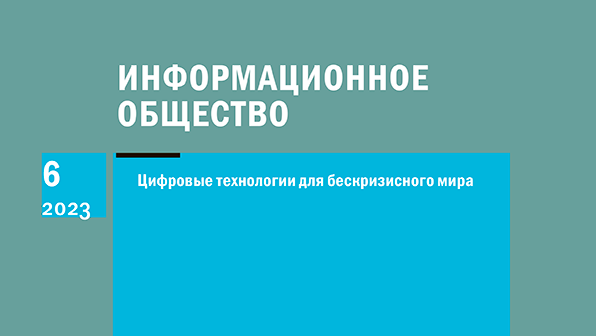The main theme of the release is “Digital technologies for a crisis-free world”. It is revealed in 12 articles devoted to the following:
Development of digital humanities
Communications to reduce conflict potential
Trust as an institution of the digital economy
Neural networks for public safety
Human capital for the creative economy
Digitalization of municipalities
Digital temporary employment platforms
Project-based learning in robotics
Digital technologies for waste management
In her address to readers, the editor-in-chief of the magazine Tatiana Ershova wrote:
Traditionally, in the last issue of the outgoing year, we analyze the results of editorial activities. In total, 82 articles were published in 2023, which was an absolute record for all 34 years of the existence of the journal. The authors proposed works in a variety of research areas, and, despite all the rigor of the evaluation (the editors rejected 31% of the articles received), almost all thematic sections were filled.
The largest number of works was contained in the “Digital Economy” rubric (9), followed by “Information Society and Law” (8). Seven articles each were located in the headings “Information Society and State Power”, “Education in the Information Society” and “Information Society Technologies”, six each in the headings “The Human in the Information Society”, “Measuring the Information Society”, “Information Society and Mass Media”, five each in the headings “Information Society: Policy and Drivers” and “Social and Economic Aspects of the Information Society”. Headings “Fundamental Research in the field of Information Society”, “Science and Innovation in the Information Society”, “Trust and Security in the Information Society”, “Foreign Experience. International Cooperation” included three articles each this year, while the headings “Healthcare in the Information Society” and “Culture in the Information Society” included only two each. Unfortunately, the sections “Leaders of the Information Society” and “Sports and Tourism in the Information Society” were left without content, and this, unfortunately, is a fairly typical situation.
The number of our authors was 143, and this is also an unprecedented figure. Most of them naturally represented Russia, and the geographical coverage was also wider than ever: 25 regions! There were 69 Muscovites among our authors, 11 researchers from Tyumen, seven from Nalchik, six from Simferopol; from Perm, Samara and St. Petersburg – five each; from Vladivostok, Volgograd and Kursk – four each; from Veliky Novgorod, Yekaterinburg and Saransk – three each; from Abakan, Astrakhan, Yoshkar-Ola, Kazan and Ufa – two each; From Balashikha, Voronezh, Kaliningrad, Magnitogorsk, Nizhny Novgorod, Omsk and Tomsk – one each. Two authors represented Azerbaijan and one was from the People’s Republic of China.
Among the authors of 2023 there were full members of the Russian Academy of Education, Russian Academy of Natural Sciences and Russian Academy of Engineering (one each), 40 doctors of science, 71 candidates of science, 16 specialists without an academic degree, five applicants (including graduate students and adjuncts), as well as three masters and eight students. The academic title of professor is held by 25 authors of articles of this year, and associate professor by 45. It should be especially noted that among the authors of the works there were seven members of the Editorial Board.
We have something to be proud of and, of course, we have something to work on. On the eve of the New Year, on behalf of the entire editorial board, I traditionally want to thank our authors, reviewers and readers for their cooperation and interest in our journal and wish everyone good health, prosperity and success.
The contents of the issue (in Russian) are available on the journal’s digital platform.
